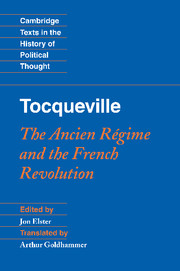Book contents
- Frontmatter
- Contents
- Introduction
- Bibliographical Note
- Chronology
- TOCQUEVILLE: THE ANCIEN RÉGIME AND THE FRENCH REVOLUTION
- Foreword
- Book I
- Book II
- II.1 Why Feudal Prerogatives Had Become More Odious to the People in France Than Anywhere Else
- II.2 Why Administrative Centralization Is an Institution of the Ancien Régime and Not, As Some Say, the Work of the Revolution or Empire
- II.3 How What Today Is Called Administrative Tutelage Is an Institution of the Ancien Régime
- II.4 How Administrative Justice and the Immunity of Public Officials Were Institutions of the Ancien Régime
- II.5 How Centralization Was Thus Able to Insinuate Itself among the Old Powers and Supplant Them Without Destroying Them
- II.6 On Administrative Mores under the Ancien Régime
- II.7 How France, of All the Countries of Europe, Was Already the One in Which the Capital Had Achieved the Greatest Preponderance over the Provinces and Most Fully Subsumed the Entire Country
- II.8 That France Was the Country Where People Had Become Most Alike
- II.9 How Men So Similar Were More Separate Than Ever, Divided into Small Groups Alien and Indifferent to One Another
- II.10 How the Destruction of Political Liberty and the Separation of Classes Caused Nearly All the Maladies That Proved Fatal to the Ancien Régime
- II.11 On the Kind of Liberty to Be Found under the Ancien Régime and Its Influence on the Revolution
- II.12 How, Despite the Progress of Civilization, the Condition of the French Peasant Was Sometimes Worse in the Eighteenth Century Than It Had Been in the Thirteenth
- Book III
- Appendix: On the Pays d'états, and in Particular Languedoc
- Notes
- Index
- CAMBRIDGE TEXTS IN THE HISTORY OF POLITICAL THOUGHT
II.7 - How France, of All the Countries of Europe, Was Already the One in Which the Capital Had Achieved the Greatest Preponderance over the Provinces and Most Fully Subsumed the Entire Country
Published online by Cambridge University Press: 05 June 2012
- Frontmatter
- Contents
- Introduction
- Bibliographical Note
- Chronology
- TOCQUEVILLE: THE ANCIEN RÉGIME AND THE FRENCH REVOLUTION
- Foreword
- Book I
- Book II
- II.1 Why Feudal Prerogatives Had Become More Odious to the People in France Than Anywhere Else
- II.2 Why Administrative Centralization Is an Institution of the Ancien Régime and Not, As Some Say, the Work of the Revolution or Empire
- II.3 How What Today Is Called Administrative Tutelage Is an Institution of the Ancien Régime
- II.4 How Administrative Justice and the Immunity of Public Officials Were Institutions of the Ancien Régime
- II.5 How Centralization Was Thus Able to Insinuate Itself among the Old Powers and Supplant Them Without Destroying Them
- II.6 On Administrative Mores under the Ancien Régime
- II.7 How France, of All the Countries of Europe, Was Already the One in Which the Capital Had Achieved the Greatest Preponderance over the Provinces and Most Fully Subsumed the Entire Country
- II.8 That France Was the Country Where People Had Become Most Alike
- II.9 How Men So Similar Were More Separate Than Ever, Divided into Small Groups Alien and Indifferent to One Another
- II.10 How the Destruction of Political Liberty and the Separation of Classes Caused Nearly All the Maladies That Proved Fatal to the Ancien Régime
- II.11 On the Kind of Liberty to Be Found under the Ancien Régime and Its Influence on the Revolution
- II.12 How, Despite the Progress of Civilization, the Condition of the French Peasant Was Sometimes Worse in the Eighteenth Century Than It Had Been in the Thirteenth
- Book III
- Appendix: On the Pays d'états, and in Particular Languedoc
- Notes
- Index
- CAMBRIDGE TEXTS IN THE HISTORY OF POLITICAL THOUGHT
Summary
It is neither the location, the size, nor the wealth of a capital that is responsible for its political preponderance over the rest of the country, but rather the nature of the government.
London, whose population is as great as that of some kingdoms, has to date not exerted sovereign influence over the fate of Great Britain.
No citizen of the United States imagines that the people of New York can decide the fate of the American union. Indeed, no one even in the state of New York imagines that that city's wishes should be the sole determinant of policy. Yet there are as many people living in New York today as there were living in Paris at the outbreak of the Revolution.
Paris itself, during the Wars of Religion, was as populous compared to the rest of the kingdom as it would be in 1789. Yet it could decide nothing on its own. At the time of the Fronde, it was still only the largest city in France. By 1789 it had become France itself.
In 1740 Montesquieu wrote to a friend: “In France there is only Paris, together with the remote provinces, because Paris has not yet had time to devour them.”
- Type
- Chapter
- Information
- Tocqueville: The Ancien Régime and the French Revolution , pp. 71 - 75Publisher: Cambridge University PressPrint publication year: 2011

